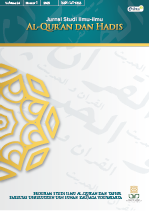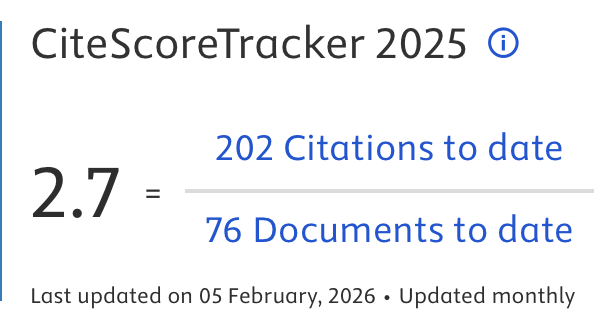To what Extent Can the Diversity of Qur’anic Tafsir be Described as ‘Traditions of Reason’
DOI:
https://doi.org/10.14421/qh.v24i1.4303Keywords:
Tafsir, Rational, Traditional, RiwayahAbstract
This paper examines tafsir as one of the oldest scientific disciplines developed by Muslims, who experienced dialectical shifts from time to time. Early tafsir was characterized by the bi al-mathur tradition or by its reliance on riwayah sources. While it is commonly argued that this mode of interpretation leaves no place for the mufassir's intervention, his subjectivity and rationality in choosing the preferred tradition cannot be ignored. Following that, tafsir evolved according to the bi al-ra'yi tradition which is believed to emphasize the mufassir’s reasoning while interpreting the Qur’an. This paper is addressed to examine this categorization, using Sherman Jackson’s traditions of reason that aim to compromise tafsir with varying hues of traditionalist and rationalist perspectives. This paper employs the library method by reviewing relevant literature to answers the main question. In the end, the limitations of a tafsir can be accepted as traditions of reason as long as the interpretation adheres to the fundamental criteria of interpretation. This includes mufassir’s profound understanding, no conflict with other verses or hadith, and, in many cases, its conformity with logic. Traditional and Rational elements are complementary and must be addressed proportionately. The emphasis on reason has the potential to lead to the mufassir's personal preferences and biases. Meanwhile, the usage of traditional riwayah will limit interpretive space and the context's applicability.
References
Abdul-Raof, Hussein. (2010) Schools of Qur’anic Exegesis: Genesis and Development. London: Routledge.
Ahmed, Shahab. (2016) What is Islam? The Importance of Being Islamic. New Jersey: Princeton University Press.
Asad, Talal. (2009) ‘The Idea of an Anthropology of Islam’ Qui Parle, 17 (2), pp. 1-30.
Campanini, Massimo. (2007) The Qur’an: The Basics. Translated by Leaman, Oliver. New York: Routledge.
Eliade, Mircea. (2001) ‘Tafsir’ in Rippin, Andrew (ed). The Qur’an and its Interpretative Tradition. USA: Ashgate Variorum, pp. X:1-24.
Esack, Farid. (2005) The Qur’an: A User’s Guide. Oxford: Oneworld Publications.
Ernst, Carl W. (2016) Sufism: An Introduction to the Mystical Tradition of Islam. Colorado: Shambhala Publications Inc.
Fadl, Khaled Abou. (2007) The Great Theft: Wrestling Islam from the Extremists. New York: Harper San Fransisco.
Fadl, Khaled Abou. (2014) Speaking in God’s Name: Islamic Law, Authority, and Women. London: Oneworld Publications.
Goldziher, Ignaz. (2006) Schools of Koranic Commentators. Translated by Behn, Wolfgang H. Germany: Harrassowitz Verlag.
Haleem, M.A.S. Abdel. (2005) The Qur’an: A New Translation. Oxford: Oxford University Press.
Hidayatullah, Aysha A. (2014) Feminist Edges of the Qur’an. Oxford: Oxford University Press.
Jackson, Sherman. (2002) On the Boundaries of Theological Tolerance in Islam. Oxford: Oxford University Press.
Jauhari, Tantawi. (2004) al-Jawahir fi Tafsir al-Qur’an al-Karim. Kairo: Dar al-Kutub al-Ilmiyyah.
Leaman, Oliver (ed). (2006). The Qur’an: an Encyclopedia. New York: Routledge.
Martensson, Ulrika. (2020) ‘Early Medieval Tafsir (Third/Ninth to the Fifth/Eleventh Century)’ in Shah, Mustafa. and Haleem, Muhammad Abdel (eds). The Oxford Handbook of Qur’anic Studies. Oxford: Oxford University Press, pp. 715-731.
Motzki, Harald. (2003) ‘The Question of the Authenticity of Muslim Traditions Reconsidered: A Review Article’ in Bert, Herbert (ed). Method and Theory in the Study of Islamic Origins. Leiden: Brill, pp. 211-258.
Mustaqim, Abdul. (2010) Epistemologi Tafsir Kontemporer. Yogyakarta: LKIS Printing Cemerlang.
Najjar, Zaghloul. (no date) Wonders of the Ever-Gorious Qur’an. Translated by The English Convoy. Online pdf version. Available at https://vdocuments.mx/dr-zaghloul-an-najjar-miracles-in-the-quran.html (Accessed: 10 January 2022)
Nasr, Sayyed Hossein. (2000) Ideals and Realities of Islam. Chicago: ABC International Group Inc.
Qushairi. (2000) Lata’if al-Isyarat: Tafsir Sufi Kamil al-Qur’an al-Karim. Kairo: Dar al-Misriyyah.
Razi, Fakhr Din. (1981) Tafsir al-Kabir wa Mafatih al-Ghayb: Juz al-Salasun. Beirut: Dar Fikr.
Sabuni, Muhammad ‘Ali. (2011) Al-Tibyan fi ‘Ulum al-Qur’an. Pakistan: Al-Bushra Publishers.
Saeed, Abdullah. (2006) Interpreting the Qur’an: Towards a Contemporary Approach. London: Routledge.
Saeed, Abdullah. (2008) The Qur’an: an Introduction. London: Routledge.
Sands, Kristin Zahra. (2006) Sufi Commentaries on the Qur’an in Classical Islam. London: Routledge.
Tustari, Sahl bin Abd Allah. (2011) Tafsir al-Tustari: Great Commentaries on the Holy Qur’an. Translated by Keeler, Annabel. and Keeler, Ali. Jordan: Royal al-Bayt Institute for Islamic Thought.
Zahabi, Muhammad Husein. (2005) Tafsir wa al-Mufassirun: Juz al-Awwal. Kairo: Maktabah Wahbah.
Zahabi, Muhammad Husein. (2005) Tafsir wa al-Mufassirun: Juz al-Sani. Kairo: Maktabah Wahbah.
Zamakhshari, Abi Qasim Mahmud bin Umar. (1998) Al-Kasyaf ‘an Haqa’iq Ghamawidh al-Tanzil wa ‘Uyun al-‘Aqawil fi Wujuh al-Ta’wil: al-Juz al-Sadis. Riyadh: Maktabah Abikan.
Zamakhshari, Abi Qasim Mahmud bin Umar. (1998) Al-Kasyaf ‘an Haqa’iq Ghamawidh al-Tanzil wa ‘Uyun al-‘Aqawil fi Wujuh al-Ta’wil: al-Juz al-‘Awwal. Riyadh: Maktabah Abikan.
Zayd, Nasr Hamid Abu. (2003) ‘The Dilemma of the Literary Approach to the Qur’an’, Alif: Journal of Comparative Poetics, (23), pp. 8-47.
Zayd, Nasr Hamid Abu. (2004) Rethinking the Qur’an: Towards a Humanistic Hermeneutics. Amsterdam: Humanistics University Press.
Downloads
Published
Issue
Section
License
Copyright (c) 2023 Muhammad Luthfi Dhulkifli

This work is licensed under a Creative Commons Attribution-NonCommercial-NoDerivatives 4.0 International License.
Publishing your paper with Jurnal Studi Ilmu-ilmu al-Qur'an dan Hadis means that the author or authors retain the copyright in the paper. Jurnal Studi Ilmu-ilmu al-Qur'an dan Hadis uses license CC-BY-NC-ND or an equivalent license as the optimal license for the publication, distribution, use, and reuse of scholarly works. This license permits anyone to copy and redistribute the material in any medium or format and must give appropriate credit, provide a link to the license, and indicate if changes were made. If you remix, translate, transform or build upon the material you may use it for private use only and not for distribution. Jurnal Studi Ilmu-ilmu al-Qur'an dan Hadis granted an exclusive non-commercial reuse license by the author(s), but the author(s) are able to put the paper onto a website, distribute it to colleagues, give it to students, use it in your thesis, etc, so long as the use is not directed at a commercial advantage or toward private monetary gain. The author(s) can reuse the figures and tables and other information contained in their paper published by Jurnal Studi Ilmu-ilmu al-Qur'an dan Hadis in future papers or work without having to ask anyone for permission, provided that the figures, tables, or other information that is included in the new paper or work properly references the published paper as the source of the figures, tables or other information, and the new paper or work is not direct at a private monetary gain or commercial advantage.
Jurnal Studi Ilmu-ilmu al-Qur'an dan Hadis journal Open Acces articles are distrubuted under the Creative Commons Attribution-NonCommercial-NoDerivatives 4.0 International (CC BY-NC-ND 4.0). Article can be read, copy and redistribute the material ini any medium or format under the following conditions:
Attribution — You must give appropriate credit, provide a link to the license, and indicate if changes were made. You may do so in any reasonable manner, but not in any way that suggests the licensor endorses you or your use.
NonCommercial — You may not use the material for commercial purposes.
NoDerivatives — If you remix, transform, or build upon the material, you may not distribute the modified material.











